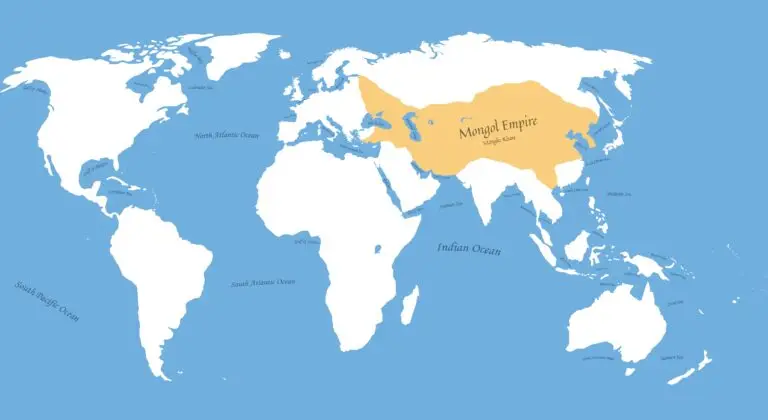Mongol Empire

Table of Contents
Mongol Empire Overview
The Mongol Empire was one of the largest contiguous land empires in history, originating in the 13th century under the leadership of Genghis Khan. It stretched from Eastern Europe to East Asia, encompassing territories in modern-day China, Mongolia, Russia, Central Asia, the Middle East, and Eastern Europe.
The Mongols were skilled horsemen and fierce warriors, using superior tactics and military organization to conquer vast territories. Under Genghis Khan and his successors, including Ögedei Khan and Kublai Khan, the Mongol Empire fostered cultural exchange, religious tolerance, and economic prosperity through the establishment of the Silk Road.
Mongol Empire History
The Mongol Empire was one of the largest contiguous land empires in history, stretching from Eastern Europe to East Asia, established by the Mongol warrior and conqueror Genghis Khan in the early 13th century.
Genghis Khan, born Temujin, united the disparate Mongol tribes through military conquests and diplomacy and was proclaimed the “Great Khan” in 1206, marking the foundation of the Mongol Empire.
Under Genghis Khan and his successors, particularly his grandsons Kublai Khan and Hulagu Khan, the Mongol Empire expanded rapidly through a series of military campaigns, known for their brutality and effectiveness.
The Mongols were skilled horsemen and archers, utilizing innovative military tactics such as feigned retreats, siege warfare, and psychological warfare to conquer and subjugate their enemies.
The Mongol Empire promoted trade and cultural exchange across Eurasia, establishing the Silk Road as a major artery for commerce and facilitating the exchange of goods, technologies, and ideas between East and West.
The Mongol Empire was organized into a highly centralized administrative system, with regional governors (known as khans or khans) appointed by the Great Khan to oversee conquered territories.
Despite their reputation for brutality in warfare, the Mongols were generally tolerant of religious and cultural diversity, allowing conquered peoples to retain their customs, languages, and religions.
The Mongol Empire reached its zenith under Kublai Khan, who established the Yuan Dynasty in China in 1271, becoming the first non-Chinese ruler to conquer all of China and rule over the largest empire in history at the time.
The decline of the Mongol Empire began in the late 14th century, due to factors such as internal divisions, succession disputes, overextension of resources, and the emergence of resistance movements.
Despite its eventual fragmentation, the Mongol Empire had a lasting impact on the history and culture of Eurasia, influencing the development of trade, diplomacy, and statecraft, and leaving a legacy of conquest, innovation, and cultural exchange.
Related Links
Byzantine Empire
Gupta Empire
Ottoman Empire
Silk Road